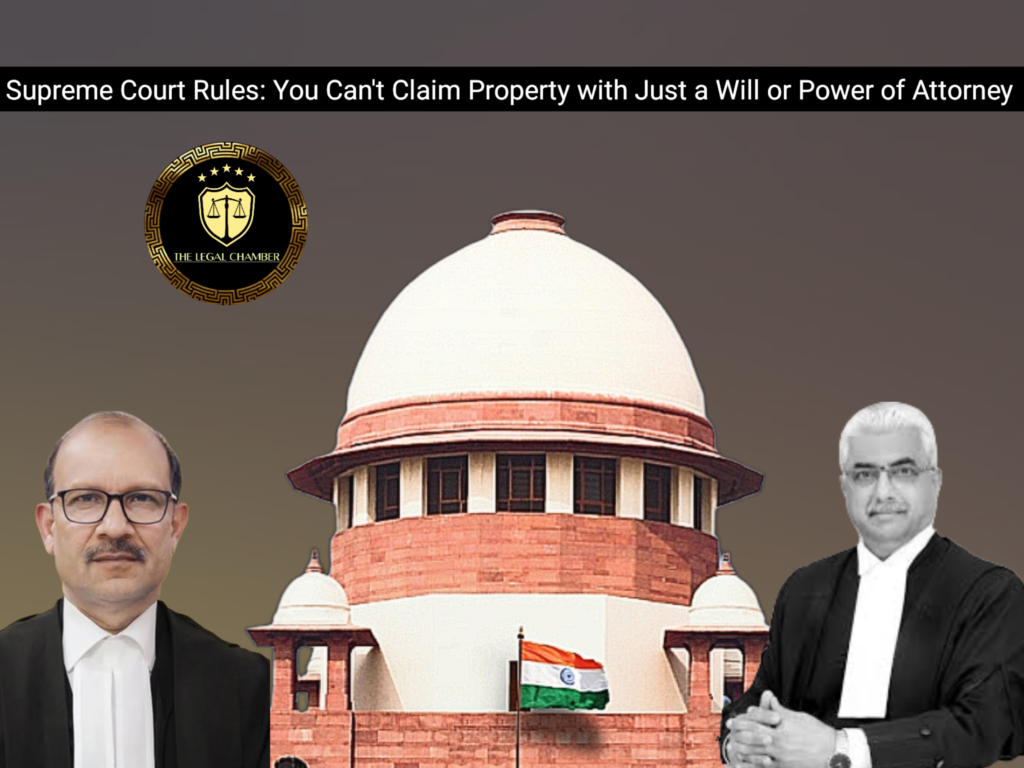
This Supreme Court judgment reaffirms that an Agreement to Sell, General Power of Attorney, Will, or receipt of payment does not constitute a transfer of title under the Transfer of Property Act, 1882. Only a duly registered sale deed confers ownership. The doctrine of part-performance under Section 53A is inapplicable without the transferee being in possession, and a Will must be proved in strict compliance with the Indian Succession Act and Evidence Act.
Facts Of The Case:
The case involved a dispute over a property in Delhi between two brothers, Suresh Chand (Plaintiff) and Ramesh Chand (Defendant No. 1), after the death of their father, Kundan Lal. Suresh claimed ownership of the property based on a set of documents executed by their father on a single day in 1996, including a General Power of Attorney, an Agreement to Sell, an Affidavit, a Receipt for consideration, and a registered Will. He filed a suit seeking possession from Ramesh, whom he alleged was a licensee and later a trespasser. In response, Ramesh contended that the property had been orally transferred to him by their father back in 1973 and that he had been in continuous possession since. He also filed a counterclaim, arguing that the documents relied upon by Suresh were invalid. The Trial Court and the High Court had previously decreed the suit in Suresh’s favour. However, the Supreme Court was tasked with determining the legal validity of these documents to confer title, ultimately leading to its landmark decision.
Procedural History:
The procedural history of this case began with the plaintiff, Suresh Chand, filing a suit for possession and declaration of title before the Additional District Judge, Delhi. The Trial Court decreed the suit in his favour, upholding the validity of the documents and dismissing the defendant’s counterclaim. Aggrieved by this, the defendant, Ramesh Chand, filed a Regular First Appeal (RFA No. 358/2000) before the High Court of Delhi. The High Court initially dismissed the appeal, relying on a judgment that was later overruled. This led Ramesh Chand to file Civil Appeal No. 9012/2011 before the Supreme Court. The Supreme Court remanded the matter back to the High Court for a fresh decision, directing it to reconsider the case in light of the correct legal position. Upon remand, the High Court again dismissed the appeal, prompting the defendant to file the present civil appeal before the Supreme Court, which ultimately allowed it and set aside the judgments of the courts below.
READ ALSO:Supreme Court Rules: High Court Cannot Grant Anticipatory Bail if FIR Discloses SC/ST Act Offence
Court Observation:
The Supreme Court made crucial observations on the legal sanctity of documents used for property transfers. It authoritatively held that an Agreement to Sell, General Power of Attorney, Will, Affidavit, or Receipt, whether registered or not, cannot by themselves transfer title or create any interest in an immovable property. The Court reiterated that a transfer of ownership can only be effected through a duly registered sale deed as mandated by Section 54 of the Transfer of Property Act, 1882. It further observed that the Will propounded by the plaintiff was not proved in accordance with the mandatory requirements of the Indian Succession Act and the Evidence Act, as attesting witnesses were not examined and suspicious circumstances surrounding its execution were not dispelled. Additionally, the Court noted that the plaintiff could not claim the benefit of the doctrine of part-performance under Section 53A of the TP Act, as he was never in possession of the suit property, a fundamental prerequisite for invoking this provision.
Final Decision & Judgement:
The Supreme Court allowed the appeal and set aside the judgments of the High Court and the Trial Court. Consequently, the plaintiff’s suit for possession, declaration, and mesne profits was dismissed. The Court held that the plaintiff failed to establish a valid title through the Agreement to Sell, GPA, Will, or other documents, as none of them constitute a legally recognized instrument of transfer. The property, therefore, devolved upon the Class-I legal heirs of the original owner, Kundan Lal, upon his death. While the appellant’s counterclaim was not explicitly reinstated, the dismissal of the plaintiff’s suit had the practical effect of negating the plaintiff’s claim. The Court also protected the rights of the second defendant, a subsequent purchaser, to the extent of the share he purchased from the appellant, leaving all parties at liberty to pursue their respective shares in the property through a fresh suit if so advised.